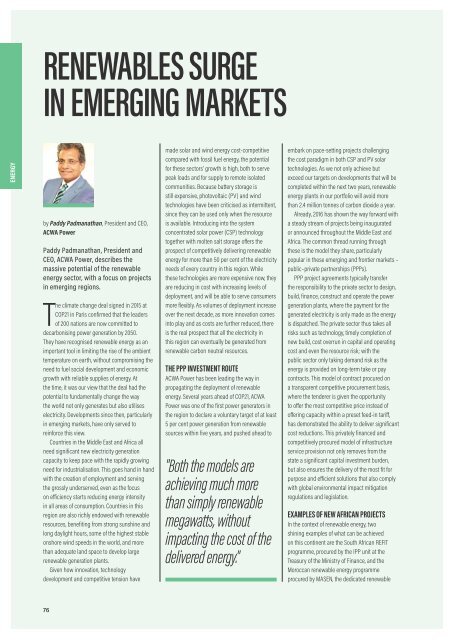Climate Action 2016-2017
Create successful ePaper yourself
Turn your PDF publications into a flip-book with our unique Google optimized e-Paper software.
RENEWABLES SURGE<br />
IN EMERGING MARKETS<br />
ENERGY<br />
by Paddy Padmanathan, President and CEO,<br />
ACWA Power<br />
Paddy Padmanathan, President and<br />
CEO, ACWA Power, describes the<br />
massive potential of the renewable<br />
energy sector, with a focus on projects<br />
in emerging regions.<br />
The climate change deal signed in 2015 at<br />
COP21 in Paris confirmed that the leaders<br />
of 200 nations are now committed to<br />
decarbonising power generation by 2050.<br />
They have recognised renewable energy as an<br />
important tool in limiting the rise of the ambient<br />
temperature on earth, without compromising the<br />
need to fuel social development and economic<br />
growth with reliable supplies of energy. At<br />
the time, it was our view that the deal had the<br />
potential to fundamentally change the way<br />
the world not only generates but also utilises<br />
electricity. Developments since then, particularly<br />
in emerging markets, have only served to<br />
reinforce this view.<br />
Countries in the Middle East and Africa all<br />
need significant new electricity generation<br />
capacity to keep pace with the rapidly growing<br />
need for industrialisation. This goes hand in hand<br />
with the creation of employment and serving<br />
the grossly underserved, even as the focus<br />
on efficiency starts reducing energy intensity<br />
in all areas of consumption. Countries in this<br />
region are also richly endowed with renewable<br />
resources, benefiting from strong sunshine and<br />
long daylight hours, some of the highest stable<br />
onshore wind speeds in the world, and more<br />
than adequate land space to develop large<br />
renewable generation plants.<br />
Given how innovation, technology<br />
development and competitive tension have<br />
made solar and wind energy cost-competitive<br />
compared with fossil fuel energy, the potential<br />
for these sectors’ growth is high, both to serve<br />
peak loads and for supply to remote isolated<br />
communities. Because battery storage is<br />
still expensive, photovoltaic (PV) and wind<br />
technologies have been criticised as intermittent,<br />
since they can be used only when the resource<br />
is available. Introducing into the system<br />
concentrated solar power (CSP) technology<br />
together with molten salt storage offers the<br />
prospect of competitively delivering renewable<br />
energy for more than 50 per cent of the electricity<br />
needs of every country in this region. While<br />
these technologies are more expensive now, they<br />
are reducing in cost with increasing levels of<br />
deployment, and will be able to serve consumers<br />
more flexibly. As volumes of deployment increase<br />
over the next decade, as more innovation comes<br />
into play and as costs are further reduced, there<br />
is the real prospect that all the electricity in<br />
this region can eventually be generated from<br />
renewable carbon neutral resources.<br />
THE PPP INVESTMENT ROUTE<br />
ACWA Power has been leading the way in<br />
propagating the deployment of renewable<br />
energy. Several years ahead of COP21, ACWA<br />
Power was one of the first power generators in<br />
the region to declare a voluntary target of at least<br />
5 per cent power generation from renewable<br />
sources within five years, and pushed ahead to<br />
"Both the models are<br />
achieving much more<br />
than simply renewable<br />
megawatts, without<br />
impacting the cost of the<br />
delivered energy."<br />
embark on pace-setting projects challenging<br />
the cost paradigm in both CSP and PV solar<br />
technologies. As we not only achieve but<br />
exceed our targets on developments that will be<br />
completed within the next two years, renewable<br />
energy plants in our portfolio will avoid more<br />
than 2.4 million tonnes of carbon dioxide a year.<br />
Already, <strong>2016</strong> has shown the way forward with<br />
a steady stream of projects being inaugurated<br />
or announced throughout the Middle East and<br />
Africa. The common thread running through<br />
these is the model they share, particularly<br />
popular in these emerging and frontier markets –<br />
public–private partnerships (PPPs).<br />
PPP project agreements typically transfer<br />
the responsibility to the private sector to design,<br />
build, finance, construct and operate the power<br />
generation plants, where the payment for the<br />
generated electricity is only made as the energy<br />
is dispatched. The private sector thus takes all<br />
risks such as technology, timely completion of<br />
new build, cost overrun in capital and operating<br />
cost and even the resource risk; with the<br />
public sector only taking demand risk as the<br />
energy is provided on long-term take or pay<br />
contracts. This model of contract procured on<br />
a transparent competitive procurement basis,<br />
where the tenderer is given the opportunity<br />
to offer the most competitive price instead of<br />
offering capacity within a preset feed-in tariff,<br />
has demonstrated the ability to deliver significant<br />
cost reductions. This privately financed and<br />
competitively procured model of infrastructure<br />
service provision not only removes from the<br />
state a significant capital investment burden,<br />
but also ensures the delivery of the most fit for<br />
purpose and efficient solutions that also comply<br />
with global environmental impact mitigation<br />
regulations and legislation.<br />
EXAMPLES OF NEW AFRICAN PROJECTS<br />
In the context of renewable energy, two<br />
shining examples of what can be achieved<br />
on this continent are the South African REFIT<br />
programme, procured by the IPP unit at the<br />
Treasury of the Ministry of Finance, and the<br />
Moroccan renewable energy programme<br />
procured by MASEN, the dedicated renewable<br />
76












